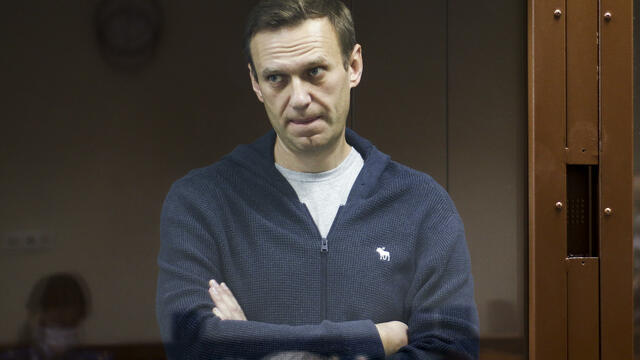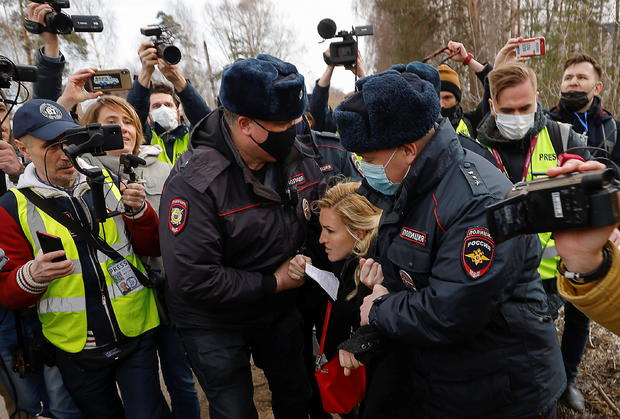▶ Watch Video: Biden sanctions Russian officials over Putin critic’s poisoning
Moscow — A handful of Russian activists and journalists were detained on Tuesday as they gathered outside a prison to demand that jailed opposition leader Alexey Navalny receive proper medical care amid reports that his health is deteriorating. Navalny said via his associates a day earlier that he had a fever and a bad cough, noting that several other inmates in his unit had been hospitalized with tuberculosis.
Last week, the 44-year-old fierce critic of President Vladimir Putin announced that he was going on hunger strike to demand medical care after complaining of back pain and numbness in his legs.
On Tuesday afternoon, a group of pro-Navalny activists from the Alliance of Doctors, a union of medical professionals led by his ophthalmologist Anastasia Vasilyeva, went to the penal colony about 60 miles outside of Moscow to demand they be given access to him, or that the prison administration give him the professional medical care of his choice.
They were met by police and heightened security measures outside the facility and were not allowed inside. At least nine people were detained by police, including some journalists. CNN correspondent Matthew Chance posted a tweet showing himself in police custody.
Before being held by the police, Vasilyeva told reporters outside the facility that she planned to come back on Wednesday and every day after that until Navalny was provided with professional medical care and medication.
“I just want to help my patient, who is now in a terrible situation,” she told reporters near the prison.
Navalny was moved to a prison infirmary with symptoms of a respiratory infection, and has been tested for the coronavirus, the pro-Kremlin Izvestia newspaper reported on Monday evening, citing the prison service.
In an Instagram post published by his team, Navalny joked darkly that catching tuberculosis might offer him relief from his other ailments.
“If I have tuberculosis, then maybe it’ll chase out the pain in my back and numbness in my legs. That’d be nice,” he wrote. He said he planned to continue his hunger strike. The politician has lost at least 28 pounds since arriving at the notorious penal colony, according to his lawyer.
Prison officials did not reply to CBS News’ request for a comment.
Navalny was sentenced earlier this year to two and a half years in prison for violating the terms of a previous suspended sentence. He was arrested in January soon after his return to Moscow from Berlin, where he spent five months recovering from severe poisoning with the Soviet-era nerve agent Novichok.
Amnesty International Secretary General Agnes Callamard said she had written to Putin about Navlany’s condition and his imprisonment, warning the Russian leader that the opposition figure was at risk of being subjected to “a slow death.”
Kremlin spokesman Dmitry Peskov told reporters on Tuesday that he had no information about the letter from Callamard. He also said Navalny’s health was a matter for the prison service, adding that all the necessary steps were being taken to care for the inmate.
Navalny has always dismissed all the charges against him as politically motivated. His arrest prompted weeks of mass protests, with thousands rallying on the streets of Russian cities, including the capital.
The United States, the European Union and various individual EU countries have called on Putin’s government to release Navalny immediately, but the Kremlin has shrugged off those calls as interference in Russia’s internal affairs.



































